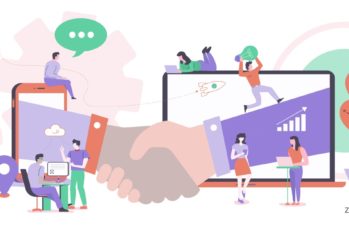How smart will our smart phones REALLY get? Well, Google just announced that they have created an open platform for mobile phones to send and receive payments using NFC technology. They’ve already partnered with Citi, Mastercard, FirstData, and Sprint, and are open to accepting more partners. Trials have already begun, and by the summer it will be official. By 2014, the majority of phones will have NFC technology.
So, here are the answers to your most pressing questions:
What is NFC?
NFC stands for Near Field Communication. It is a wireless technology that lets devices communicate to each other over very short distances (roughly 4 cm). It can work between mobile devices, and between a stationary and mobile device. The chip will be in most new smart phones.
What does this mean for consumers?
Your phone is going to be doing a LOT more than it already does. Your wallet and phone will be one. Going to the movies? Swipe your phone to buy the tickets, and then swipe it again to “check in” to the movies. Google is also working on Google Offers. This will allow you to save coupons and deals to your phone. It also means that marketers will be better able to target you based on your interests and location. Personally, I do hope that Google does a better job with their customer service for the Google Wallet than they have in the past. After all, where does the buck really stop?
Who is using NFC?
According to Retrevo, almost everybody is already working on this. This is from their blog:
“At the moment it seems to be lining up as the carriers vs platform providers vs financial institutions. Apple and Microsoft are both rumored to be adding the chip to their phones; though there are conflicting sources that say it will not be showing up in the iPhone 5, as Apple is concerned by the lack of a clear standard within the industry. When it does, no doubt the billing will go through iTunes. Google’s Android 2.3 already offers NFC support and the Nexus S comes equipped with the necessary hardware. They already have deals with Mastercard and Citigroup and seem to be moving faster than their competitors.
AT&T, Verizon and T-Mobile have joined together to form Isis, a collaborative venture that includes several major banks. Barclaycard will be the first to issue customers with an Isis enabled bank account.
The banks likewise, are already working on their own mobile payment options and have even begun testing them in several major cities.”
Are mobile wallets going to be secure?
It will be a lockable wallet. According to Stephanie Tilenius, Google’s VP of Commerce, some security measures will include a phone lock, a Google pin, credit card information encryption. Much like with online websites, your credit card may never be fully displayed. Security is a concern will all credit card transactions. It is interesting to note though that many countries already use NFC technology for everyday transactions. My personal sentiment is that this may actually be safer than “carrying” a card.
So, should I wait to buy the new phones?
Not at all. Most new phones will have the NFC technology within the chip. If you have an older phone, the NFC technology can be integrated into your SIM and SD cards.
What does NFC technology mean for businesses?
I’ve often said that we as consumers keep raising the bar. Not only do we want more, but we want more ways to get it. Think, how many ways can you now consume information? Paper, PDF, video, and the list could go on forever. As businesses, that means we have to rise to meet the same demand we as the consumers have created. Luckily, NFC technology shouldn’t be as hard to integrate into your current systems as say the PC originally was. It does mean that you will have to be able to accept such mobile payments. Mostly likely, your credit card processing company will take care of it for you. And, if you resist, be sure for feedback like “I can’t believe they require an actual card! How old fashioned!”
Bottom Line:
Mobile technology is taking another step forward. Are there risks? Yes. But, the payoff will be worth it. For consumers, in terms of ease, and for businesses as one more revenue stream.



